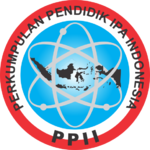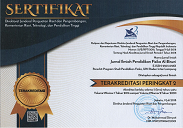Does the cognitive activity can generate student’s physics argumentation performance features?
Abstract
Full Text:
PDFReferences
Berland, L. K., & Hammer, D. (2012). Framing for scientific argumentation. Journal of Research in Science Teaching, 49(1), 68–94.
Boone, W.J., Staver, J.R., & Yale, M.S. (2014). Rasch Analysis in the Human Science. Springer.
Creswell, J. W., Plano Clark, V. L., Gutmann, M., & Hanson, W. (2003). Advanced mixed methods research designs. In A. Tashakkori & C. Teddlie, Eds., Handbook of mixed methods in social and behavioral research. Sage Publications.
Evagorou, M., & Dillon, J. (2011). Argumentation in the teaching of science. In D. Corrigan, J. Dillon, & R. Gunstone, Eds., The professional knowledge base of science teaching. Springer.
Ford, M. J. (2012). A dialogic account of sense-making in scientific argumentation and reasoning. Cognition and Instruction, 30(3), 207–245.
González-Howard, M., McNeill, K. L., Marco-Bujosa, L., & Proctor, C. P. (2017). ‘Does it answer the question or is it French fries?’: An exploration of language supports for scientific argumentation. International Journal of Science Education, 39(5), 528–547.
Guzey, S. S., Ring-Whalen, E. A., Harwell, M., & Peralta, Y. (2017). Life STEM: A Case Study of Life Science Learning Through Engineering Design. International Journal of Science and Mathematics Education, 17(1), 23-42.
Hsu, P.-S., Lee, E. M., Ginting, S., Smith, T. J., & Kraft, C. (2019). A Case Study Exploring Non-dominant Youths’ Attitudes Toward Science Through Making and Scientific Argumentation. International Journal of Science and Mathematics Education, 17(1), 185-207.
Jiménez-Aleixandre, M. P., & Erduran, S. (2008). Argumentation in science education: An overview. In S. Erduran & M. P. Jimenez Aleixandre, Eds., Argumentation in science education: Perspectives from classroom-based research. Springer.
Johnson, C. C., Peters-Burton, E. E., & Moore, T. J. (Eds.). (2016). STEM road map: A framework for integrated STEM education. Routledge.
Khishfe, R. (2014). Relationship between nature of science understandings and argumentation skills: A role for counterargument and contextual factors. Journal of Research in Science Teaching, 49(4), 485-514.
Locke, L. F., Spirduso, W. W., & Silverman, S. J. (2013). Proposals that work: A guide to planning dissertations and grant proposals (6th ed.). Sage Publications.
Martins, M., & Justi, R. (2019). An instrument for analyzing students’ argumentative reasoning when participating in debates. International Journal of Science Education, 41(6), 713-738.
Marshall, C., & Rossman, G. B. (2015). Designing qualitative research (6th ed.). Sage Publications.
McDonald, C. V., & McRobbie, C. J. (2010). Utilizing argumentation to teach nature of science. In B. J. Fraser, K. G. Tobin, & C. J. McRobbie (Eds.), Second international handbook of science education. Springer.
McNeill, K. L., González-Howard, M., Katsh-Singer, R., & Loper, S. (2017). Moving beyond pseudo argumentation: Teachers’ enactments of an educative science curriculum focused on argumentation. Science Education, 101(3), 426–457.
McNeill, K. L., & Pimentel, D. S. (2010). Scientific discourse in three urban classrooms: The role of the teacher in engaging high school students in argumentation. Science Education, 94(2), 203–229.
Miller, E., Manz, E., Russ, R., Stroupe, D., & Berland, L. (2018). Addressing the epistemic elephant in the room: Epistemic agency and the next generation of science standards. Journal of Research in Science Teaching, 55(7), 1053–1075.
Mortimer, E. F., & Scott, P. H. (2003). Meaning-making in secondary science classrooms. Maidenhead, England: Open University Press.
Murphy, P. K., Greene, J. A., Allen, E., Baszczewski, S., Swearingen, A., Wei, L., & Butler, A. M. (2018). Fostering High School Students’ Conceptual Understanding and Argumentation Performance in Science through Quality Talk discussions. Science Education, 102(6), 1239-1264.
National Research Council (NRC). (2012). A framework for k-12 science education: Practices, crosscutting concepts, and core ideas. The National Academies Press.
O’Conner, M. C., & Michaels, S. (1993). Aligning academic task and participation status through revoicing: Analysis of a classroom discourse strategy. Anthropology and Education Quarterly, 24(4), 318–335.
Osborne, J. (2010). Arguing to learn in science: The role of collaborative, critical discourse. Science, 328(5977), 463–466.
Sampson, V., Grooms, J., & Walker, J. P. (2011). Argument-driven inquiry as a way to help students learn how to participate in scientific argumentation and craft written arguments: An exploratory study. Science Education, 95(2), 217–257.
Sandoval, W. A., Enyedy, N., Redman, E. H., & Xiao, S. (2019). Organizing a culture of argumentation in elementary science. International Journal of Science Education, 41(13), 1–22.
Schwarz, C. V., Passmore, C., & Reiser, B.J. (2017). Helping students make Sense of The World using Next Generation Science and Engineering Practices. National Science Teachers Association Press.
Simon, S., Erduran, S., & Osborne, J. (2006). Learning to teach argumentation: Research and development in the science classroom. International Journal of Science Education, 28(2), 235–260.
Stanford, C., Moon, A., Towns, M., & Cole, R. (2016). Analysis of instructor facilitation strategies and their influences on student argumentation: A case study of a process-oriented guided inquiry learning physical chemistry classroom. Journal of Chemical Education, 93(9), 1501–1513.
Viyanti. (2019). Pengembangan Instrumen Penilaian Keterampilan Berargumentasi untuk Pembelajaran Prinsip Archimedes. Surakarta: UNS. Disertasi.
Viyanti, Cari, Sunarno, W., & Prasetyo, Z. K. (2016). Pemberdayaan Keterampilan Argumentasi Mendorong Pemahaman Konsep Siswa. Jurnal Penelitian Pendidikan Fisika, 7(1), 43–48.
Wingate, U. (2019). “Can you talk me through your argument”? Features of dialogic interaction in academic writing tutorials. Journal of English for Academic Purposes, 38, 25–35
DOI: http://dx.doi.org/10.24042/jipfalbiruni.v9i1.6264
Refbacks
- There are currently no refbacks.

Jurnal ilmiah pendidikan fisika Al-Biruni is licensed under a Creative Commons Attribution-ShareAlike 4.0 International License.
![]()







